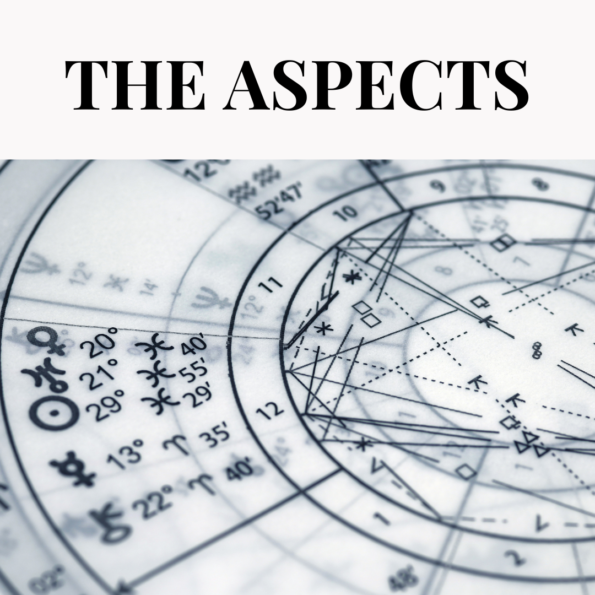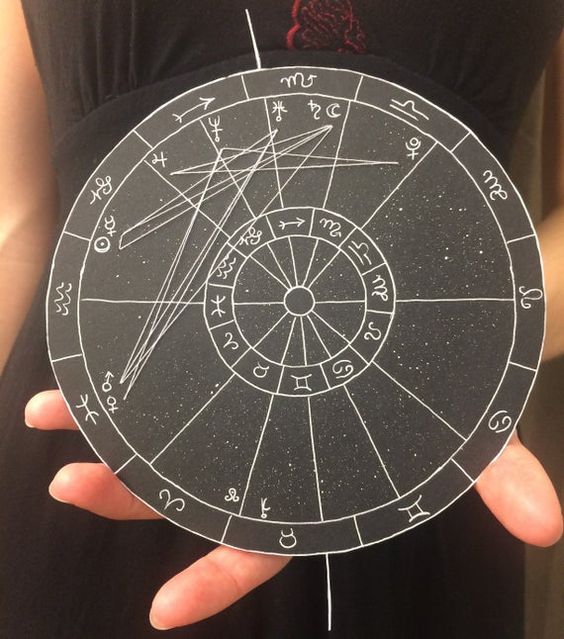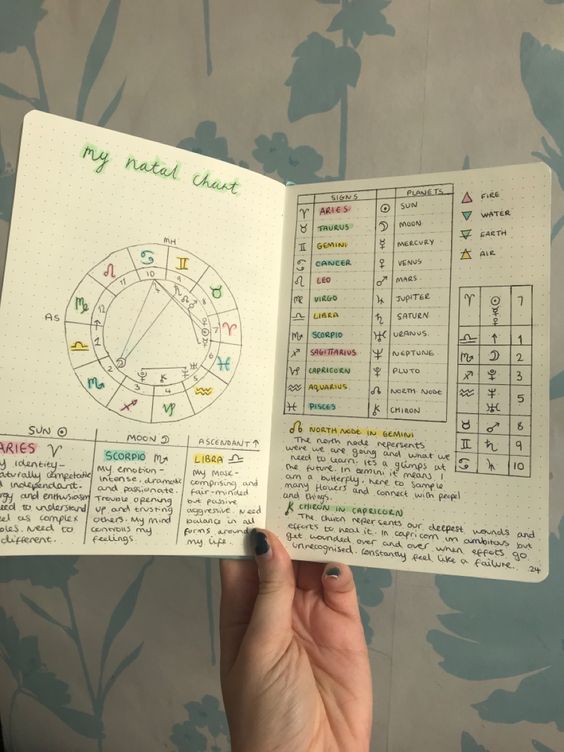
Astrology: The Major Aspects
 A natal chart symbolizes not only the potential struggles one might face but also highlights the inherent strengths and creative outlets available to them. The aspects, namely conjunctions, sextiles, squares, trines, and oppositions, serve as indicators of various psychic energies and interactions. Understanding the aspects within a horoscope reveals not just challenges and talents, but also the dynamic interplay between different facets of personality. Each aspect brings a different layer of insight into an individual’s character, contributing to a holistic view that encompasses drives, conflicts, potentials, and innate qualities.
A natal chart symbolizes not only the potential struggles one might face but also highlights the inherent strengths and creative outlets available to them. The aspects, namely conjunctions, sextiles, squares, trines, and oppositions, serve as indicators of various psychic energies and interactions. Understanding the aspects within a horoscope reveals not just challenges and talents, but also the dynamic interplay between different facets of personality. Each aspect brings a different layer of insight into an individual’s character, contributing to a holistic view that encompasses drives, conflicts, potentials, and innate qualities.
Conjunction: This aspect occurs when two planets are in the same sign and close in degrees. It represents a fusion of the planets’ energies, intensifying their characteristics. A conjunction can symbolize a point of emphasis or power in a person’s chart, where traits are blended into a potent force that can be either harmonious or challenging, depending on the planets involved.
Sextile: Representing an angle of 60 degrees between two planets, the sextile is a harmonious aspect that facilitates communication and interaction between the energies of the planets involved. This aspect is often associated with talents and abilities that manifest naturally, providing opportunities for growth and expression. It can indicate areas where individuals may find creative solutions and cooperative endeavors.
Square: This 90-degree angle is one of the most tension-filled aspects and is often a significant indicator of internal conflict. Squares challenge individuals, pushing them towards growth through struggle and effort. The friction generated by squares can lead to dynamic action, resolution, and significant life lessons, although they may initially present as obstacles or conflicts.
Trine: Formed when planets are 120 degrees apart, trines are considered the most favorable aspects, facilitating ease and flow of energies. They enhance natural talents and supportiveness, bringing about ease and harmony. However, because they make things so comfortable, they can also lead to complacency and lack of motivation if not actively engaged with.
Opposition: At 180 degrees, an opposition represents a tug of war between two planetary energies, highlighting areas of life that require balance and often manifesting as external challenges or conflicts with others. This aspect can create tension but also immense potential for growth as individuals seek to find balance between opposing forces.
Psychological Astrology: Orbs and Their Impact
Dane Rudhyar’s approach to astrology highlights the transformative potential inherent in understanding one’s astrological influences, which is especially pertinent in the context of psychological astrology.
In astrological terms, the “orb” refers to the degree of deviation allowed from the exact angle that forms an aspect between planets. A tighter orb—meaning the planets are very close to the exact angle—suggests a stronger, more pronounced influence. Rudhyar says that aspects with tighter orbs manifest in more unconscious, automatic behaviors. These can become so ingrained that they operate almost without our awareness, deeply embedded into our psyche.
On the other hand, aspects with wider orbs are seen as offering more flexibility. These influences are considered less intense and more amenable to conscious modification. Many psychologists astrologers argue that looser orbs offer individuals greater opportunities to exercise free will and adaptability in their behaviors and reactions.
Transformation Through Self-Awareness
As individuals become more aware of their astrological influences, they gain the opportunity to work constructively with these aspects. Learning to integrate them more fully into conscious behavior, potentially reshaping reactions and habits that were previously more rigid or unconscious. For example, someone with a square between Mercury and Mars might initially experience this as occasional tension between their actions (Mars) and communication (Mercury).
However, as they become more aware of this aspect’s influence, they can start to see how these moments of tension could be opportunities for assertive communication rather than conflict. With increased awareness, individuals are less likely to act out these energies in unconscious ways. Instead, they can recognize where energies are out of balance and find ways to integrate them more effectively into their lives.
Action and Growth
Hard aspects in astrology—the conjunction, square, and opposition act as catalysts, insisting on action and growth, often through confrontation and resistance. Hard aspects do not allow for passivity. Unlike the ease provided by trines and sextiles, these aspects often present challenges that require direct engagement. For instance:
Conjunctions can merge planetary energies so intensely that they may overshadow other dynamics in the chart, demanding integration and frequent self-reflection to manage effectively.
Squares create a sense of tension and urgency, often presenting as recurring problems or persistent internal conflicts that demand resolution. This aspect forces growth through discomfort, compelling us to act, react, and adapt.
Oppositions involve polarities that require constant balancing. They highlight areas where external circumstances or relationships may provoke personal growth or change.
Impact on Personal Expression and Reality
The continual friction generated by hard aspects can be frustrating. It often manifests as both internal and external conflict, reflecting our struggles in real-world scenarios. When these planetary influences repeatedly obstruct or interfere with our desires or actions, the frustration can lead to feelings of being stuck or opposed at every turn.
The inherent discomfort of these aspects can also trigger negative expressions of energy. For example, someone may react to the perpetual challenges of a square by exhibiting anger or resistance, or by adopting unhealthy coping mechanisms. However, this same energy can serve as a powerful motivator. It can propel us to find creative solutions or to push through adversity, transforming challenges into opportunities for personal strength and resilience.
Release and Transformation of Energy
The key to harnessing the energy of hard aspects lies in the release and constructive use of the built-up stress. While it’s tempting to release this energy through negative outlets, such as aggression or evasion, more positive pathways can be cultivated through awareness and deliberate action. Furthermore, approaching these challenges from a higher perspective can significantly alter outcomes. If we can recognize the purpose behind the obstacles—growth and self-improvement—we can adopt a more constructive approach.
Aspects: Understanding Modality
Understanding modes in astrology can be beneficial. It can provide insights into potential themes and challenges arising from different aspects, helping interpret them more effectively. Delving deeper into modes and signs enhances the interpretation of aspects.
Cardinal Aspects
People born under the cardinal signs—Aries, Cancer, Libra, and Capricorn—embody the initiating force of these zodiac signs. Each cardinal sign begins a new season, representing new beginnings, leadership, and the catalytic energy necessary to start projects. This group is characterized by certain traits and challenges that deeply influence their life path, particularly in terms of relationships, family, career, and personal identity.
Aries: As the first sign of the zodiac and a cardinal fire sign, Aries is driven by a strong desire to pioneer and lead. They are known for their dynamic energy and assertiveness. Aries individuals are often focused on developing their personal identity and pursuing their goals with relentless determination. However, their impulsive nature can sometimes lead to conflicts in relationships, as they strive for independence and can sometimes come off as aggressive or self-centered.
Cancer: Cancer marks the start of summer and is a cardinal water sign, which makes individuals born under this sign highly intuitive and emotionally driven. They are focused on creating security and comfort and are deeply tied to their home and family. Cancers are nurturing and protective, but their strong emotional ties can lead to challenges in achieving a balance between their need for emotional security and their relationships. Issues may arise from their tendency to be overly protective or from the difficulty they face when needing to let go or move on.
Libra: Starting the autumn season, Libra is a cardinal air sign that is all about balance and relationships. Libras are keen on fairness, justice, and harmony in all aspects of life. They excel in diplomacy and social interactions, making them natural mediators. However, their focus on maintaining peace can sometimes lead to challenges, such as avoiding confrontations or struggling with decisiveness, which can impact their relationships and hinder the development of a firm personal identity.
Capricorn: As the cardinal earth sign that initiates winter, Capricorns are known for their ambitious drive, discipline, and practical approach. They are focused on career and long-term goals, often taking on leadership roles. Capricorns are determined to build a stable foundation for themselves and their loved ones, which can sometimes lead to an overemphasis on work, potentially neglecting their home life or relationships. Their challenge lies in balancing their professional ambitions with their personal life.
Common Traits and Challenges
Cardinal signs are leaders and initiators, making them excellent at starting projects and inspiring others. Their proactive nature, however, can also lead to challenges. They often take on too much or push too hard, leading to potential burnout and conflict. Each sign, while powerful in initiating, must learn to manage their inherent qualities to avoid overwhelming themselves and those around them. In relationships, cardinal signs need partners who understand their need for independence and respect their leadership qualities but who can also provide the balance and support needed to temper their intense focus on their own goals. At home and in family life, they need to balance their drive with nurturing and attention to emotional needs. In their careers, they must guard against the potential for overwork and ensure they remain connected to their broader life goals, including their development of identity, which is crucial for their overall satisfaction and happiness. Understanding these dynamics can help cardinal signs achieve more harmonious relationships and a more balanced approach to the various areas of their lives.
Fixed Aspects
Individuals born under the fixed signs—Taurus, Leo, Scorpio, and Aquarius—exhibit characteristics associated with stability, determination, and persistence. These signs occur in the middle of the seasons, embodying the fullness and consistency of their time of year. Fixed signs are known for their strong wills and deep-rooted power, making them some of the most hardworking and enduring characters of the zodiac.
Taurus: As a fixed earth sign, Taurus values stability, consistency, and physical pleasures. They are highly focused on security and comfort, often making them excellent at accumulating wealth and resources. Taureans are known for their steadfast nature and reluctance to change, which can sometimes manifest as stubbornness. Their challenge lies in balancing their desire for material security with flexibility and openness to new experiences.
Leo: Leo, a fixed fire sign, thrives on stability in their self-expression and creativity. Leos are dynamic leaders who are driven by a desire for recognition and admiration. Their strong determination makes them excellent at pushing forward their ideas and maintaining their creative vision. However, their need for control and attention can lead to conflicts, especially when they perceive their authority or authenticity being challenged.
Scorpio: Scorpio is a fixed water sign known for its intense emotional depth and powerful instincts. Scorpios are incredibly determined and rarely change course once they have set their sights on a goal. This sign’s challenges often revolve around issues of control and power in relationships. Scorpios must learn to temper their intensity and practice vulnerability without feeling a loss of control.
Aquarius: As a fixed air sign, Aquarius is focused on intellectual and social stability. Aquarians are often ahead of their time, deeply committed to their ideals and visions of future possibilities. Their challenge is that they can become so fixed in their beliefs and aspirations that they may become inflexible, resisting changes that do not align with their expectations or ideals.
Common Traits and Challenges
Fixed signs share a common ability to sustain effort and focus until they achieve their goals. Their determination is their greatest strength, providing the stamina required to see projects through to completion. However, this same strength can become a weakness if it turns into stubbornness or inflexibility. In relationships, fixed signs are loyal and dedicated but may struggle with compromise. They often resist attempts by others to control or change them, valuing their independence and self-expression highly. This can lead to challenges in personal relationships, where give and take are necessary for harmony. The key for fixed signs to maximize their potential is to cultivate flexibility without losing their essence. They need to learn when to hold firm and when to adapt, balancing their strong desires and self-motivation with the needs and expectations of others around them. By acknowledging the value in compromise and the strength in flexibility, fixed signs can maintain their powerful presence while also developing healthier, more fulfilling relationships and achieving a well-rounded approach to their ambitions and goals.
Mutable Aspects
Mutable signs—Gemini, Virgo, Sagittarius, and Pisces—are the adaptable, flexible finishers of the zodiac. These signs correspond with the end of each season, bringing about transition and preparation for the next phase. Mutable individuals are known for their versatility, their ability to adjust and their inherent restlessness. They are the synthesizers of the zodiac, blending the lessons learned and preparing for new beginnings.
Gemini: As a mutable air sign, Gemini thrives on variety, communication, and information exchange. They are naturally curious, possessing an insatiable desire to learn about everything around them. Geminis are adept at juggling multiple interests and tasks simultaneously, which can sometimes lead to them spreading themselves too thin or appearing scattered. Their challenge is to find ways to deepen their knowledge rather than just broadening it, and to focus their diverse energies more effectively.
Virgo: Virgo, a mutable earth sign, focuses on refinement and service. Virgos are detail-oriented and highly analytical, always striving to improve systems and make things more efficient. They are practical and grounded yet flexible enough to adapt when necessary to optimize their efforts. Virgos’ challenge is to avoid becoming overly critical or so bogged down in details that they lose sight of the bigger picture.
Sagittarius: Representing the mutable fire sign, Sagittarius is driven by a thirst for knowledge and exploration. Sagittarians are the adventurers of the zodiac, always on a quest for philosophical or literal journeys. Their optimism and love for freedom make them highly adaptable, but they can also become restless and non-committal if not intellectually stimulated. The challenge for Sagittarius is to find a meaningful direction that satisfies their need for exploration without leading them to feel confined.
Pisces: As a mutable water sign, Pisces is the most adaptable of the water signs, often highly empathetic and intuitive. They are dreamers with a deep spiritual and emotional life. Pisces can adapt to their surroundings with ease, often absorbing the emotions of those around them, which can make them feel overwhelmed or lost. The challenge for Pisces is to establish boundaries and find a grounding mechanism that helps them navigate their deep emotional waters without getting lost in them.
Common Traits and Challenges
Mutable signs are essential for initiating change. They process the transitions between the rigid stability of fixed signs and the initiating forces of cardinal signs, making them naturally gifted at seeing all sides of a situation and adapting accordingly. Their flexibility, however, can sometimes come at the cost of having a clear direction or purpose, leading them to feel restless or indecisive. In relationships and personal pursuits, mutable signs benefit from having a defined goal or path to channel their considerable energies and adaptability. Without a clear direction, they can become overly flexible to the point of losing their own perspective or desires. Finding balance allows these individuals to harness their restless energy towards their goals while staying open to new experiences.



















 Venus-Pluto Synastry: A Love So Powerful That It Might Just Kill Them
Venus-Pluto Synastry: A Love So Powerful That It Might Just Kill Them
 Moon Conjunct Pluto Synastry
Moon Conjunct Pluto Synastry
 The Cost of Living Through the Eyes of Aquarius
The Cost of Living Through the Eyes of Aquarius
 Sun Square Pluto Synastry: You’ve Got That Power Over Me
Sun Square Pluto Synastry: You’ve Got That Power Over Me
 Scorpio’s Jealousy
Scorpio’s Jealousy
 Jungian and Freudian Astrology: Part 1
Jungian and Freudian Astrology: Part 1
 Mercury Conjunct Venus Synastry
Mercury Conjunct Venus Synastry
 Venus Trine Mars Synastry
Venus Trine Mars Synastry
 The Cost of Living Through the Eyes of Capricorn
The Cost of Living Through the Eyes of Capricorn
 Mars-Pluto Synastry: Something Quite Dark and Dangerous
Mars-Pluto Synastry: Something Quite Dark and Dangerous
 Moon Square Saturn Natal Aspect
Moon Square Saturn Natal Aspect
 Neptune in the 4th House
Neptune in the 4th House
 Pluto: The Soul’s Evolution Through Relationships – Jeff Green
Pluto: The Soul’s Evolution Through Relationships – Jeff Green
 Sun Square Pluto Natal Aspect: I Am Titanium
Sun Square Pluto Natal Aspect: I Am Titanium
 Mars Trine Pluto Natal Apsect
Mars Trine Pluto Natal Apsect
 Mars Opposite Pluto Natal Aspect: Live Passionately or Burn Silently
Mars Opposite Pluto Natal Aspect: Live Passionately or Burn Silently
 Scorpio’s Cold Withdrawal
Scorpio’s Cold Withdrawal
 Composite Sun in Houses: Part 1
Composite Sun in Houses: Part 1
 Grand Fire Trine: From Adventurous Extroverts to Visionary Introverts
Grand Fire Trine: From Adventurous Extroverts to Visionary Introverts
 Liz Greene: Guide to Astrology Review
Liz Greene: Guide to Astrology Review